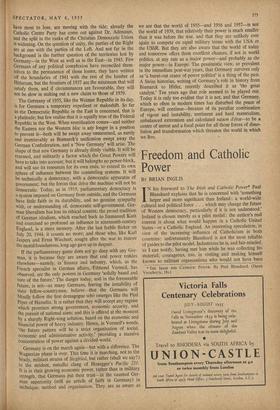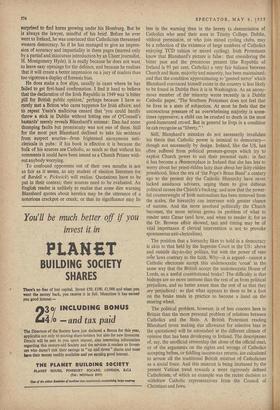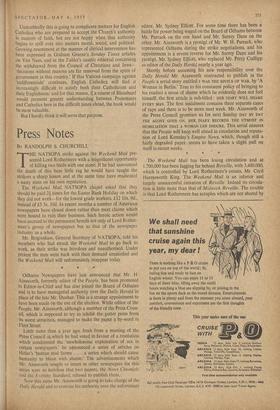Freedom and Catholic Power
BY BRIAN INGLIS surprised to find horns growing under his Homburg. But he is always the lawyer, mindful of his brief. Before he ever went to Ireland, he was convinced that Catholicism threatened western democracy. So if he has managed to give an impres- sion of accuracy and impartiality in these pages (marred only by a partial and inaccurate introduction by an Ulster journalist, H. Montgomery Hyde), it is really because he does not want to leave easy openings for the defence, and because he realises that it will create a better impression on a jury of readers than too vigorous a display of forensic bias.
He does make a few slips, usually in cases where he has failed to get first-hand confirmation. I find it hard to believe that the declaration of the Irish Republic in 1949 was 'a bitter pill for British public opinion,' perhaps because I have so rarely met a Briton who cares tuppence for Irish affairs; and to repeat Yeats's malicious canard that 'you could hardly throw a stick in Dublin without hitting one of O'Connell's bastards' merely reveals Blanshard's animus : Dan,had some thumping faults but promiscuity was not one of them. Still for the most part Blanshard declined to take his evidence from suspect sources—from frightened anonymous anti- clericals in pubs: if his book is effective it is because the bulk of his sources are Catholic, so much so that without his comments it could have been issued as a Church Primer with- out anybody worrying.
To confound opponents out of their own mouths is not as fair as it seems, as any student of election literature (or of Bardell v. Pickwick) will realise. Quotations have to be put in their context; their sources need to be evaluated. An English reader is unlikely to realise that some dire warning Blanshard quotes about heretics may be the utterance of a notorious crackpot or crank; or that its significance may lie less in the warning than in the heresy (a denunciation of Catholics who send their sons to Trinity College, Dublin, without permission, or who join mixed cycling clubs, may be a reflection of the existence of large numbers of Catholics enjoying TCD tuition or mixed cycling). Irish Protestants know that Blanshard's picture is false : that considering the bitter past and the precarious present (the Republic of Ireland is 95 per cent. Catholic) a very fair balance between Church and State, majority and minority, has been maintained; and that the condition approximating to 'genteel terror' which Blanshard convinced himself exists in the country is less likely to be found in Dublin than it is in Washington. As an anony- mous member of the minority wrote recently in a Dublin Catholic paper, 'The Southern Protestant does not feel that he lives in a state of subjection. At most he feels that the unconscious pressure of an overwhelming majority is some- times oppressive; a child can be crushed to death in the most good-humoured crowd. But in general he lives in a condition he cah recognise as "liberty." ' Still, Blanshard's mistakes do not necessarily invalidate his thesis that Catholic power is inimical to democracy— though not necessarily by design. Ireland, like the US, has often suffered from political pressure-groups which try to exploit Church power to suit their personal ends : in fact it has become a Ammonplace in Ireland that she has less to worry about her priest-ridden laity than about her laity-ridden priesthood. Since the era of 'the Pope's Brass Band' a century ago to the present day the Catholic Hierarchy , have never lacked assiduous advisers, urging them to give dubious political causes the Church's backing; and now that the power- ful counterweight of Irish nationalism has been removed from the scales, the hierarchy can intervene with greater chance of success. And the more involved politically the Church becomes, the more serious grows its problem of what to render unto Cmsar (and how, and when to render it; for as the Dr. Browne affair showed, tact and timing may be of vital impOrtance if clerical intervention is not to provoke spontaneous anti-clericalism).
The position that a hierarchy likes to hold in a democracy is akin to that held by the Supreme Court in the US : above and outside day-to-day politics, but with the power of veto over laws contrary to the faith. Why—it is argued—cannot a Catholic electorate accept this undemocratic `court' in the same way that the British accept the undemocratic House of Lords, as a useful constitutional brake? The difficulty is that bishops are no more immune than the rest of us from political prejudices, and no better aware than the rest of us that they are prejudiced : so that what appears to them to be a foot on the brake tends in practice to become a hand on the steering wheel.
The political problem, however, is of less concern here in Britain than the more personal problem of relations between Catholics and the State. A British Protestant reading Blanshard (even making due allowance for selective bias in the quotations) will be astonished at the different climate of opinion that has been developing in Ireland. The descriptions of, say, the unofficial censorship (let alone of the official one). or of the arguments on the rights and wrongs of Catholics accepting bribes, or fiddling income-tax returns, are calculated to arouse all the traditional British mistrust of Catholicism as a social force. And this mistrust is being increased by the present Vatican trend towards a more rigorously defined Catholicism, of which an example was the recent decision to withdraw Catholic representatives from the Council of Christians and Jews. Undoubtedly this is going to complicate matters for English Catholics who arc prepared to accept the Church's authority in matters of faith, but are not happy when that authority begins to spill over into matters moral, social, and political. Growing resentment at the manner of clerical intervention has been expressed in Graham Greene's Sunday Times articles on Viet Nam, and in the Tablet's caustic editorial concerning the withdrawal from the Council of Christians and Jews-- 'decisions without reasons are far removed from the spirit of government in this country.' If this Vatican campaign against indifferentishf continues, English Catholics will find it increasingly difficult to satisfy both their Catholicism and their Englishness; and for that reason, if a course of Blanshard would promote greater understanding between Protestants and Catholics here in the difficult times ahead, the book would be most valuable.
But I hardly think it will serve that purpose.












































 Previous page
Previous page